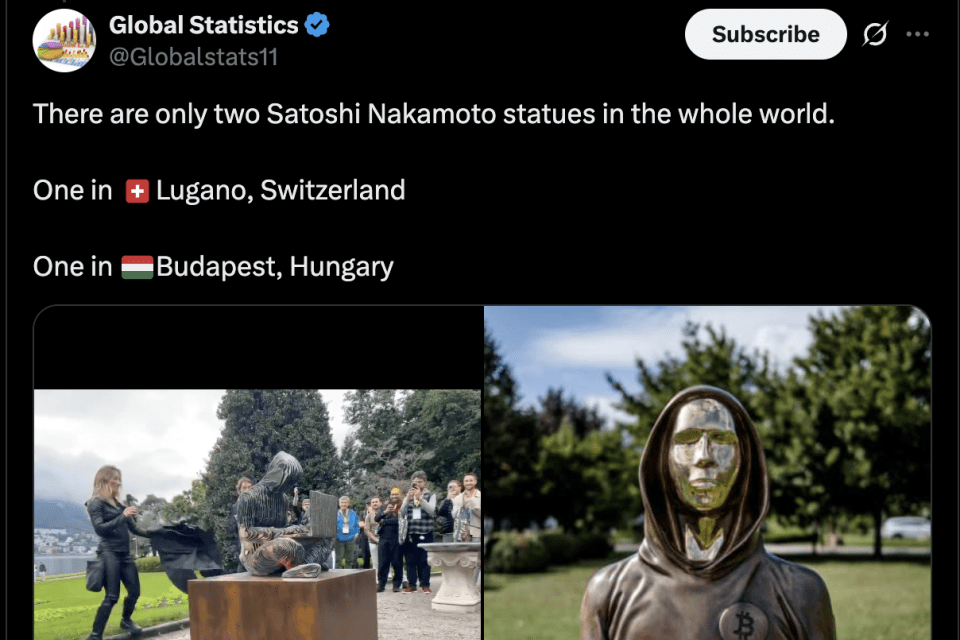I recently had the pleasure of visiting the lovely mountain town of Lugano, Switzerland, whose appeal lies in that it is basically Italy but administered by the Swiss. That’s according to Tether CEO Paolo Ardoino, one of the prime backers of Plan B, a Bitcoin conference where I hosted a discussion on the growing trend of nation states embracing the original cryptocurrency.
The event had an upbeat vibe—not surprising since everyone there worshipped Bitcoin—but it was also clear there was trouble in paradise. It turns out there is a growing schism over Bitcoin’s codebase, and whether it should be modified to permit the blockchain to include more non-financial data.
The notion of including data unrelated to Bitcoin transactions is hardly new and, indeed, the very first block on the blockchain includes a reference to a newspaper headline about bank bailouts. Now, though, Bitcoin’s biggest and most influential group of coders, known as Core, are planning to tweak their software in order to significantly lift the restrictions on how much non-payment information can be included in a block.
For the Core crowd, this is a simple and pragmatic way to promote new uses for Bitcoin and, in the process, drum up extra fees for miners at a time when the blockchain’s lottery payment is 3.125 Bitcoins, and set to halve again in 2028. A fast-growing rival faction, though, wants nothing to do with the scheme and is promoting a Bitcoin client software of its own called Knots.
That faction’s software is led by an influential Bitcoin developer, who is a devout Catholic and reportedly named it Knots after the “whip of knots” Jesus used to drive money changers from a temple. According to a lawyer I spoke with on the Knots side, the software is necessary to protect the blockchain from what he decried as spammers and “scam adjacency” projects that promote things like Bitcoin NFTs.
If you’ve encountered Bitcoiners in person or online, you’re aware they’re not known for their tact. That is true of prominent figures from Bitcoin’s early days who have been denouncing each other on stage in Lugano and on X. These high profile partisans include Peter Todd and Jameson Lopp for the Core faction, and Nick Szabo and Luke Dashjr for the rival Knots sect.
This latest schism (you can read a helpful breakdown here) hearkens back to the Bitcoin block size wars that raged from 2015 to 2017, and ultimately saw the “small blockers”—who favored keeping Bitcoin blocks at 1MB—prevail over rivals who claimed boosting the blocks to 2MB or more would be more commercially viable. That fight produced bad blood that has lasted to this day.
In the current fight, Knots is still the smaller faction, but has already become the client of choice for over 20% of Bitcoin node operators. Its growing popularity lies not only in Knots’ position on expanding the blockchain, but from a perception that the Core crowd has grown arrogant and out-of-touch with Bitcoin’s core values. The Core folks, meanwhile, dismiss the Knots faction as lying trouble-makers.
I lack the authority to weigh in on much of this, other than to observe that this latest battle for the soul of Bitcoin reinforces what I’ve said for years: Bitcoin is a marvelous technology, but also a religion. And with any religion, there will be divisions between old-line believers and more modern adherents. Happily for the crowd in Lugano, there was a moment of unity that came with the unveiling of a restored Satoshi Nakamoto statue on the city’s beautiful lakefront. Bitcoin’s factions may be at war but there’s no doubt they still worship a common god.
Jeff John Roberts jeff.roberts@fortune.com@jeffjohnroberts
DECENTRALIZED NEWS
If you can’t beat ‘em, join ‘em: JPMorgan Chase’s CEO continues to soften his longtime anti-crypto stance as his bank announced that it will let borrowers use Bitcoin and Ethereum for loan collateral by the end of year. (Bloomberg)
COIN upgrade: Coinbase’s forthcoming crypto token could be worth $12 billion to $34 billion, said a JPM analyst, who cited the token and the slowing growth of DEXes as reasons to upgrade the stock ahead of third-quarter earnings this week. (DL News)
Here we ICO again? In assessing Coinbase’s $375 million acquisition of Echo, which was founded by crypto influencer Cobie and helps token projects raise funds, one journalist speculated it could inaugurate the return of 2016-style initial coin offerings. (Bloomberg)
DAT doesn’t add up: Following a Fortune exposé pointing to potential insider trading ahead of public company pivots to digital asset treasuries, a new report provides evidence that insiders tied to some popular DATs are using share sales to circumvent token lockups. (Unchained)
Trump picks a CFTC chair: The White House selected longtime lawyer and crypto guy Mike Selig to lead the agency. The choice of Selig, which came after the Winklevii helped torpedo the original frontrunner, was hailed by industry vets who are eager to finalize a key bill that will divide responsibilities between the SEC and CFTC. (Politico)
MAIN CHARACTER OF THE WEEK
Samsul Said—Bloomberg/Getty Images
CZ was the easy choice for main character of the week after finally securing a Presidential pardon. Critics, pointing to a $2 billion deal involving the Trump family’s stablecoin and Binance, blasted the pardon as massively corrupt while many on Crypto Twitter claimed it was fair since CZ—who pleaded guilty—had allegedly been the target of a political prosecution.
MEME O’ THE MOMENT

@Globalstats11
Bitcoin devotees seeking to make a pilgrimage have a growing number of options. In addition to the refurbished Satoshi statue unveiled in Lugano, there is one in Budapest as well. Can a formal shrine—or perhaps a Bitcoin theme park—be far behind?

